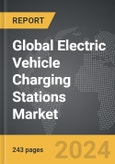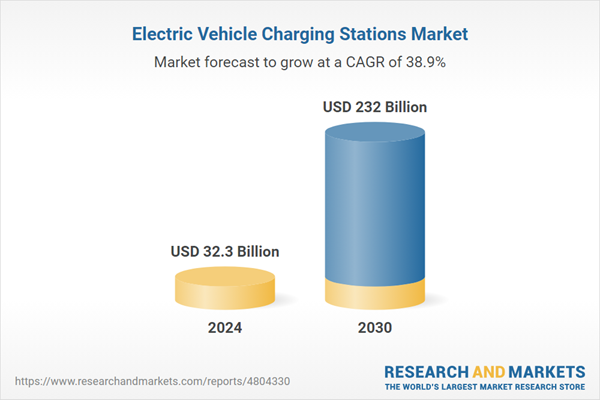Global Electric Vehicle Charging Stations Market - Key Trends and Drivers Summarized
How Are Electric Vehicle Charging Stations Powering the Shift to Electrified Transport?
Electric Vehicle (EV) charging stations are pivotal in facilitating the widespread adoption of electric vehicles, serving as the critical infrastructure needed for recharging EV batteries. As electric vehicles become more prevalent, the availability and accessibility of charging stations have become a focal point for consumers, manufacturers, and policymakers alike. These stations range from basic Level 1 chargers, which use a standard household outlet, to Level 3 chargers, or DC fast chargers, that can charge an EV battery to 80% in as little as 30 minutes. The strategic placement of charging stations in public locations, residential complexes, and workplaces not only alleviates 'range anxiety' but also supports longer journeys and encourages more consumers to transition to electric vehicles. By expanding the network of charging stations, cities and countries are enabling a smoother transition to electric mobility, thereby reducing their carbon footprint and moving towards their environmental targets.What Innovations Are Enhancing the Functionality of EV Charging Stations?
Innovations in the realm of EV charging stations are enhancing their functionality and user experience, further supporting the growth of the electric vehicle market. One of the significant advancements is the development of smart charging solutions, which allow for the integration of charging stations with smart grid technology. These systems can manage the electricity load based on peak demand times and grid capacity, improving energy efficiency and grid stability. Additionally, wireless charging technology is emerging, offering the convenience of charging without the need to plug in, potentially revolutionizing how and where EV charging can occur. Another area of innovation includes the integration of renewable energy sources such as solar panels into the charging infrastructure, which can offset the energy used by charging stations with clean, sustainable power. These technological enhancements not only make charging more accessible and efficient but also help to align EV charging with broader environmental goals.How Do EV Charging Stations Impact Urban Planning and Sustainability?
EV charging stations are increasingly being integrated into urban planning and sustainability efforts. As cities strive to reduce greenhouse gas emissions and improve air quality, supporting the transition to electric vehicles becomes a crucial strategy. The inclusion of EV charging infrastructure in residential and commercial building codes, as well as in public transport hubs, is becoming more common. This integration promotes the use of electric vehicles by making charging as convenient as refueling traditional vehicles. Furthermore, cities are leveraging EV charging stations as a part of their smart city initiatives. These stations, equipped with IoT sensors, can collect and transmit data on usage patterns, contributing to big data analytics that can inform future urban development and energy management strategies. The deployment of EV charging stations is also creating new opportunities for businesses and is stimulating local economies by attracting tech-savvy consumers and supporting the growth of the green job sector.What Trends Are Driving Growth in the Electric Vehicle Charging Station Market?
The growth in the electric vehicle charging station market is driven by several factors, including increasing sales of electric vehicles, supportive government policies, and technological advancements in charging infrastructure. As the adoption of electric vehicles accelerates, there is a corresponding surge in demand for charging solutions, both in public spaces and at home. Government incentives and regulations play a critical role, as many countries have introduced mandates and funding to support the installation of public and private EV charging stations. Additionally, advancements such as faster charging technologies and more efficient grid integration are improving the convenience and appeal of using electric vehicles. The collaboration between automakers and charging network providers is also promoting a more standardized approach to charging infrastructure, making it easier for consumers to charge their EVs as they travel. These trends highlight the dynamic growth potential of the EV charging station market, which is becoming an integral part of the global shift towards sustainable transportation solutions.Report Scope
The report analyzes the Electric Vehicle Charging Stations market, presented in terms of market value (USD). The analysis covers the key segments and geographic regions outlined below.- Segments: Type (DC Charging Station, AC Charging Station); Installation Type (Commercial, Residential).
- Geographic Regions/Countries: World; United States; Canada; Japan; China; Europe (France; Germany; Italy; United Kingdom; Spain; Russia; and Rest of Europe); Asia-Pacific (Australia; India; South Korea; and Rest of Asia-Pacific); Latin America (Argentina; Brazil; Mexico; and Rest of Latin America); Middle East (Iran; Israel; Saudi Arabia; United Arab Emirates; and Rest of Middle East); and Africa.
Key Insights:
- Market Growth: Understand the significant growth trajectory of the DC Charging Station segment, which is expected to reach US$225.3 Billion by 2030 with a CAGR of 39.6%. The AC Charging Station segment is also set to grow at 23.5% CAGR over the analysis period.
- Regional Analysis: Gain insights into the U.S. market, valued at $8.1 Billion in 2024, and China, forecasted to grow at an impressive 45.4% CAGR to reach $64.3 Billion by 2030. Discover growth trends in other key regions, including Japan, Canada, Germany, and the Asia-Pacific.
Why You Should Buy This Report:
- Detailed Market Analysis: Access a thorough analysis of the Global Electric Vehicle Charging Stations Market, covering all major geographic regions and market segments.
- Competitive Insights: Get an overview of the competitive landscape, including the market presence of major players across different geographies.
- Future Trends and Drivers: Understand the key trends and drivers shaping the future of the Global Electric Vehicle Charging Stations Market.
- Actionable Insights: Benefit from actionable insights that can help you identify new revenue opportunities and make strategic business decisions.
Key Questions Answered:
- How is the Global Electric Vehicle Charging Stations Market expected to evolve by 2030?
- What are the main drivers and restraints affecting the market?
- Which market segments will grow the most over the forecast period?
- How will market shares for different regions and segments change by 2030?
- Who are the leading players in the market, and what are their prospects?
Report Features:
- Comprehensive Market Data: Independent analysis of annual sales and market forecasts in US$ Million from 2024 to 2030.
- In-Depth Regional Analysis: Detailed insights into key markets, including the U.S., China, Japan, Canada, Europe, Asia-Pacific, Latin America, Middle East, and Africa.
- Company Profiles: Coverage of players such as ABB Ltd., AeroVironment, Inc., Alfen N.V., Allego, Blink Charging Co. and more.
- Complimentary Updates: Receive free report updates for one year to keep you informed of the latest market developments.
Some of the 43 companies featured in this Electric Vehicle Charging Stations market report include:
- ABB Ltd.
- AeroVironment, Inc.
- Alfen N.V.
- Allego
- Blink Charging Co.
- ChargePoint, Inc.
- ClipperCreek, Inc.
- EFACEC Group
- ENGIE Group
- EVgo Services LLC.
- Leviton Manufacturing Co., Inc.
- Schneider Electric SA
- SemaConnect Inc.
- Siemens AG
- Tesla, Inc.
- TGOOD Global Limited
This edition integrates the latest global trade and economic shifts into comprehensive market analysis. Key updates include:
- Tariff and Trade Impact: Insights into global tariff negotiations across 180+ countries, with analysis of supply chain turbulence, sourcing disruptions, and geographic realignment. Special focus on 2025 as a pivotal year for trade tensions, including updated perspectives on the Trump-era tariffs.
- Adjusted Forecasts and Analytics: Revised global and regional market forecasts through 2030, incorporating tariff effects, economic uncertainty, and structural changes in globalization. Includes historical analysis from 2015 to 2023.
- Strategic Market Dynamics: Evaluation of revised market prospects, regional outlooks, and key economic indicators such as population and urbanization trends.
- Innovation & Technology Trends: Latest developments in product and process innovation, emerging technologies, and key industry drivers shaping the competitive landscape.
- Competitive Intelligence: Updated global market share estimates for 2025, competitive positioning of major players (Strong/Active/Niche/Trivial), and refined focus on leading global brands and core players.
- Expert Insight & Commentary: Strategic analysis from economists, trade experts, and domain specialists to contextualize market shifts and identify emerging opportunities.
Table of Contents
Companies Mentioned (Partial List)
A selection of companies mentioned in this report includes, but is not limited to:
- ABB Ltd.
- AeroVironment, Inc.
- Alfen N.V.
- Allego
- Blink Charging Co.
- ChargePoint, Inc.
- ClipperCreek, Inc.
- EFACEC Group
- ENGIE Group
- EVgo Services LLC.
- Leviton Manufacturing Co., Inc.
- Schneider Electric SA
- SemaConnect Inc.
- Siemens AG
- Tesla, Inc.
- TGOOD Global Limited
Table Information
| Report Attribute | Details |
|---|---|
| No. of Pages | 243 |
| Published | January 2026 |
| Forecast Period | 2024 - 2030 |
| Estimated Market Value ( USD | $ 32.3 Billion |
| Forecasted Market Value ( USD | $ 232 Billion |
| Compound Annual Growth Rate | 38.9% |
| Regions Covered | Global |









